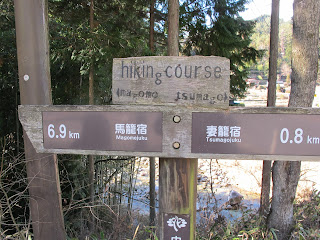In our last
blog post we talked about the Gokaido, the five routes built in the Edo
period of Japan, which connected the capital of Edo, modern Tokyo, with the
outer provinces of the country. We also talked about the Tokaido, one of the
two routes connecting the old capital of Kyoto with the new capital of Tokyo.
The Tokaido was popular among poets and artists, and was the quickest way
between the two cities, but also more dangerous because you needed to cross a
number of rivers. What was an Edo period samurai to do, when he was worried
about the safety of his family? This is where the Nakasendo comes in.
 |
The Tokaido in 1825
Source: Wikimedia Commons
|
With a distance of approximately 534km, the Nakasendo ran
the length of Japan from Kyoto to Tokyo, passing though the modern day
prefectures of Saitama, Gunma, Nagano, Gifu and Shiga. The Nakasendo was an
inland route, unlike the Tokaido, which followed the coast. Even though the
Nakasendo is longer, many travellers preferred travelling the Nakasendo, as it
didn’t involve any fording of rivers, thus making it a safer journey.
Tsumago & Magome
Before the Nakasendo officially came into existence in the
17th century, there were a number of smaller, postal routes
throughout Japan, connecting towns and villages across a variety of distances.
One such postal route, connecting 11 towns and villages was called the Kisoji.
Even though most of the Nakasendo has been replaced with more modern roads and
railroads, this portion of the route is still intact, between the towns of
Tsumago and Magome.
 |
A section of the Nakasendo between Magome and Tsumago.
Source: JNTO
|
The trail between the two towns is pretty short, clocking in
at 8km, and is remarkably well preserved. Any markings on the road are in both
Japanese and English, making it very friendly for anyone who is visiting. There
is a town at either end of the Kisoji postal route, and you can go from one to
the other in either direction.
 |
| Hiking between Tsumago and Magome |
The town of Tsumago is one of the best preserved postal
towns in Japan, and the locals put huge effort into maintaining the town’s historic
feel. The old inns are preserved, looking the same as they would have during
the Edo period, whole traffic isn’t allowed on the main street. In addition all
cables, for both power and telephones have been concealed to add to the
authentic “I’ve stepped back in time” feeling.
Magome is another well preserved town, but whereas Tsumago
is a bit more rugged and authentic, Magome is slightly more modern in its
preservation. Both towns can be visited in a single day, either by bus, or by
hiking the historic postal route.
 |
| The town of Tsumago |
Does the Nakasendo and the ancient
towns of Tsumago and Magome sound like somewhere you’d like to explore? If so,
you’ll love our
Scenic Samurai Trails Tour. This tour will give you a taste of what life
was like for someone who would have travelled these roads. You will be led by
local mountain guides who will accompany you through forest trails and valley
gorges on foot, by boat, and private vehicles, staying overnight in mountain
lodges and traditional minshiku. Not only will you travel sections of the
ancient postal routes, but you’ll also experience the incredible Kumano Kodo
pilgrimage, for an unforgettable, once in a lifetime experience.
A trip to the towns of Tsumago and Magome, not to mention the hiking between them, can also be included in any tailor made tour!

No comments:
Post a Comment